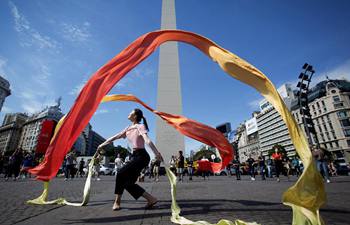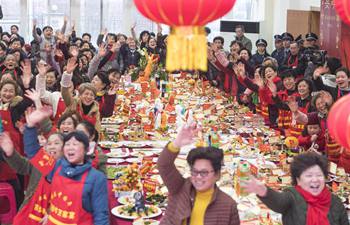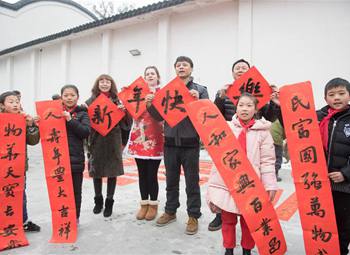ISTANBUL, Feb. 9 (Xinhua) -- Kilis, a small Turkish town bordering Syria, has once again become the frequent target of rocket firings as Turkish troops are fighting Kurdish militia in northern Syria.
The town has come under rocket attacks at least 34 times over the past three weeks, ever since the Turkish military launched the "Operation Olive Branch" on Jan. 20 to drive out the Kurdish militants, known as the People's Protect Units (YPG), from Afrin district in northwestern Syria.
So far, two people have been killed and more than 50 others injured, according to Hasan Kara, the mayor of the town.
"Terrorists are attacking civilians in their most intimate locations: their bedrooms, living rooms, dining rooms and their most holy places like mosques," Kara told Xinhua over the phone.
One rocket hit a mosque at central Kilis during the evening prayer time on the fourth day of the operation, killing an elderly tailor and a young Syrian national.
Twenty-five minutes later, a second rocket landed on an apartment nearby, wounding four children and causing extensive damage to the structure.
A week later, the Doganhan restaurant with reporters covering the military operation, came under rocket attacks, leading to five injuries, including the owner and the chef of the restaurant.
To show solidarity, employees of the restaurants in the vicinity hung up a giant banner in the street, reading "We are not scared of anything and will never be intimidated."
Ankara regards the YPG as a terror group affiliated with the outlawed Kurdistan Workers Party (PKK) which has been fighting for autonomy in the southeast of Turkey.
Despite growing concerns, residents in Kilis choose not to leave but to face up to the new reality, said the mayor.
Shops and restaurants are still open for business, and women continue to gather together in houses of fellow housewives for social calls, while the streets are now adorned with national flags.
"We do not hide behind closed doors," Kara said. "On the contrary, we continue to live our lives in plain sight. In the streets, we come together more often than ever."
Mehmet Ali, a car mechanic in Kilis, described the rocket attacks as a new normal for locals.
Owning a small repair shop in the industrial zone of the town, Ali saw rockets falling around him several times, one of them landing just near his house, smashing the windows of the apartment.
Still, Ali has never thought about leaving the town.
"I have six children. All I have is here, my work, my home. Leaving everything behind is something impossible for us," he explained.
When the deafening roar of rockets was heard, Ali always told his children not to worry about it.
"These are fired by our guys," Ali told them.
Ali was referring to the Turkish soldiers, as it is the only way for him to relieve his children of their fear of the war.
It should be noted that it is not the first time Kilis has become the target of regular rocket assaults.
In 2016, the border town was pelted with nearly 100 rockets in the seven months before the Turkish army launched "Operation Euphrates Shield" targeting Kurdish militia and the Islamic State (IS) in northern Syria, leaving many residents killed.
"I have a 13-year-old daughter and I'm very much concerned about her," said Sukriye Tunceli, the director of the Women Vocational Training Center in Kilis.
Tunceli said she never allows her daughter out during the shool break.
"She has either stayed at home or come along to the office with me," Tunceli said.
In the face of the rocket firings, Kilis has extended the spring break for another week until Feb. 12.
"I don't know how I will let her go out when classes start next week," said Tunceli.
"But apart from that, Kilis is a border town and we are the children of the border and we have our faith," she added.
Like many others, residents in Kilis are offering full support to Turkey's military operation in Syria's Afrin.
According to Tunceli, students with her center have made 1,200 stuffed grape leaves and cookies, enough to serve 500 troops.
"We are the witnesseses of a war that takes place just before us," said Mayor Kara. "While our soldiers are there to protect us, we are here trying to do our best to support them."

















